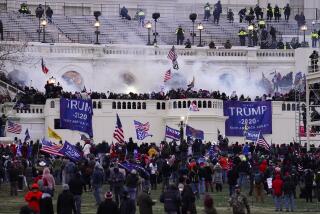Russia lawmakers advance bill on penalties for protesters
- Share via
MOSCOW — Stiff new penalties aimed at opposition protesters were given preliminary approval Tuesday by Russian lawmakers loyal to President Vladimir Putin, the target of mass rallies and demonstrations before his March election victory.
The bill, which opposition parliament members termed draconian and protested by threatening to file out of a legislative session, calls for fines of up to $50,000 and up to 200 hours of community service for organizers of rallies and demonstrations that grow violent or exceed the approved number of participants.
The sanctions were approved on first reading by parliament’s lower house, which is controlled by Putin’s United Russia party. They mark a return by the Kremlin to a tough stance against critics after concessions during the recent election campaign.
They also could trigger a strong response by anti-Putin forces, who have continued their street protests since the president was sworn into office.
“This is a monstrous legislation which demonstrates that Putin is set to prevent mass protests by any means,” Sergei Mitrokhin, the leader of the Yabloko party, said in an interview shortly after he was briefly detained by police Tuesday for picketing the parliament. “This is just the beginning of Putin’s counteroffensive as his regime will be getting more and more repressive by the day.”
The authorities want to scare people away from taking part in protests but that will serve to only radicalize government opponents, Mitrokhin predicted.
Large-scale protests have taken place since December, when the Kremlin was held responsible for alleged massive fraud in parliamentary elections that saw the ruling United Russia party take about 50% of the vote.
Putin’s presidential victory, in which he was said to receive more than 63% of the vote, also was marred by widespread accusations of electoral violations.
In between the two votes, the Kremlin offered concessions to help stem the growing protest avalanche: direct popular elections of regional governors and far easier registration of political parties.
This month alone, police have arrested hundreds of protesters, mostly in Moscow, where demonstrations have occurred daily. The biggest clash between riot police and protesters took place May 6, the eve of the presidential inauguration. Several dozen people were injured, including some police officers, and more than 600 people were detained.
On inauguration day, Putin’s motorcade rolled through virtually empty streets, guarded zealously by police. And last week, police broke up two protest encampments in downtown Moscow and arrested opposition leaders including Alexei Navalny, Sergei Udaltsov and Ilya Yashin, who are serving 10- to 15-day jail sentences.
The new sanctions, which would hit protesters hard in their wallets, caused a quick public uproar, and proponents, as a compromise, said they would lower the top fine to about $9,600 at the second reading.
Some political experts hailed the bill.
“Russian opposition leaders’ concerns about this law are understandable as they are used to conducting their actions without feeling any responsibility for possible consequences,” said Dmitry Orlov, the director-general of the Agency of Political and Economic Communications, a Moscow-based think tank. “All this talk about the law being draconic and repressive doesn’t correspond to reality. It is a necessary measure for normal political life.”
More to Read
Sign up for Essential California
The most important California stories and recommendations in your inbox every morning.
You may occasionally receive promotional content from the Los Angeles Times.










